

Page updated 6th May 2012
Around the city in the 1920s
Film from the 1920s
High Street, Queen St Station and more
Regatta, cattle market
and more
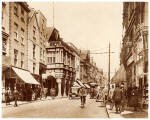 High Street
High Street
A very busy High Street looking east in the late 1920s. Note the private car and cyclist, with
a tram in the background. The tram lines were removed in 1932. Photo
- authors collection
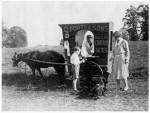 Ice Cream salesman
Ice Cream salesman
Angelo Forte
in his pony drawn icecream cart during 1926. The Forte family owned an
icecream factory in Preston Street and several
businesses in South Street. Photo Ed
Forte
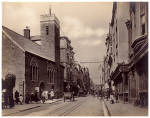 Fore Street
Fore Street
Looking east from a
point opposite Mint Lane. St Olaves' Church is on the
left while the Franklin Palace Cinema was
almost opposite the church. There are a couple of cars, but there is
still room for a horse and cart. It's a decade when women wear hats. Photo
- authors collection

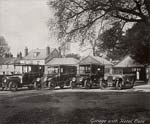 Cathedral Yard and the Royal
Clarence garage - 1927
Cathedral Yard and the Royal
Clarence garage - 1927
By
the 1920's, the Royal Clarence Hotel in Cathedral Yard had its own
garage, left, thought to be opposite the Royal Devon and Exeter
Hospital. In the photo, right, taken in Cathedral Yard, the cars are
parked outside the Clarence. The larger car, has the chauffeur standing
by. On the left is a luggage trolley of the type often used by porters
from the railway to deliver goods nad luggage.
Photo right,
courtesy Aubone Braddon
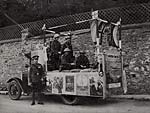 Army Recruiting Lorry - Howell Road New
Army Recruiting Lorry - Howell Road New
David West's grandfather, CSM Ernest Albert West DCM taken in Howell Road, outside of Higher Barracks when he was with the recruiting team for the Territorial Force (TA). At the time he was serving with 1st Btn Devonshire Regt. Thought to date from the late 1920s. Photo courtesy David West
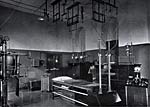
 Operating Theatre - 1929 New
Operating Theatre - 1929 New
Left is the Operating Theatre in the Royal Devon and Exeter Hospital, Southernhay West. The photo right, is the Electrical Department, which was probably an early form of ECG.
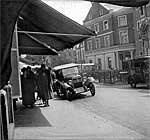
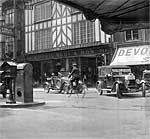 General Election 1929
General Election 1929
The 1929 General Election was held on the 29th May, resulting in a hung Parliament. It was the first election in which women could vote at the age of 21. These two photos show an election car turning into Bedford Street (right) and another election car parked in Bedford Street, outside the Conservative and Unionist Club, with the Devon and Exeter Savings Bank in the background. Original stereoscopic photos supplied by John Iffla.
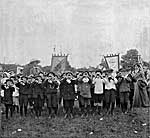
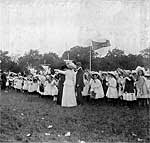 Empire Day 1929
Empire Day 1929
Empire Day was celebrated across the country on 24th May, Queen Victoria's birthday. These two photos show Exeter children celebrating the day in clothing that could have been worn thirty years earlier. Original stereoscopic photos supplied by John Iffla.
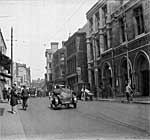
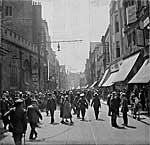 Post Office and St Stephens 1929
Post Office and St Stephens 1929
The Post Office that was lost in the blitz is shown on the right of the photo left.In the centre of the photo is Eastgate, which is now occupied by Next. The photo right, shows a very busy High Street by St Stephen's Church – whether this was just enthusiastic shoppers or a special occasion is not known. Original stereoscopic photos supplied by John Iffla.
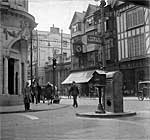 High Street from Bedford Street
High Street from Bedford Street
On the left corner is the famous Deller's Cafe of the West at the entrance to Bedford Street. Wippell's, Bruford's and Eland's are opposite – all these building were lost in the blitz. Notice the police phone box and the sign pointing to the underground toilets in the middle of Bedford Street. Original stereoscopic photo supplied by John Iffla.
 Exeter
War Memorial
Exeter
War Memorial
The Exeter
War Memorial in Northernhay Park was unveiled on
24th July 1923, by the Right Honourable Admiral David Beatty. Beatty
fought at the Battle of Jutland in 1916. He remarked after the battle "there appears to be something wrong with
our bloody ships today."
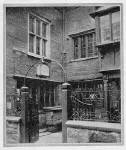 Bampfylde
House
Bampfylde
House
This photograph of Bampfylde House was in the City Council
guidebook c 1925. The house was situated just off the High Street, in Bampfylde
Street, in what is now Princesshay. It was still privately owned,
but was recognised as a potential historic building and tourist
attraction. The City Council purchased it in 1934, for it to be
destroyed in 1942.
The University College of the South West of England was established in 1922. This was the precursor of Exeter University.
The population of Exeter in the late 1920s was approximately 61,000.
The comedian Tommy Cooper moved to Exeter with his parents at the age of 3, in 1925. He lived in Ford Road, St Thomas.
The University College of the South West of England charged students an annual tuition fee of £20 to £30. There were three female and three male halls of residence which charged £55 for females and £60 for males.
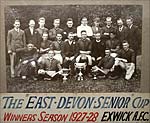 Exwick Win at Football 1928
Exwick Win at Football 1928
Exwick won a series of
football competitions after the First War - notably 1919, 1927 and
1928. Here, the Senior Team are showing off their cup after winning the
East Devon Seniors Cup for 1928. Courtesy Exwick Local History Group.
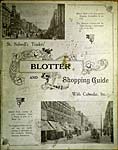
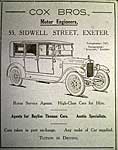 Sidwell Street Shopping Guide and Blotter 1926
Sidwell Street Shopping Guide and Blotter 1926
To promote shopping in Sidwell
Street the traders got together to print a shopping guide and
blotter. The publication was full of adverts for local companies
including Cox Bros, motor engineers.
The Royal Devon and Exeter Hospital in Southernhay had 200 beds in the 1920s. In 1925 they treated 2,692 in-patients and 7,476 out-patients.
The Devon War Memorial in Cathedral Yard was unveiled by the Prince of Wales on 16th May 1920.
Motoring and Transport in the 1920s
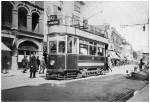
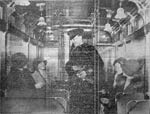 Sidwell
Street tram
Sidwell
Street tram
The left photo
shows a tram outside the headquarters of the AA, in Sidwell
Street, in 1927 or 1929. The newspaper photo on the right was in
the Exeter Gazette in 1929. A conductor takes fairs from four lady
passengers wearing 'cloche' hats, which are typical of the
period. See History of transport in Exeter for
more on the trams. Photo left Paul Freebairn
 Charabanc outing
Charabanc outing
A behatted,
charabanc trip waiting outside the Tudor Street Mission. The women
would pay weekly into a fund, for a trip - probably in this case,
Exmouth - c 1925. Photo Sylvia Hart

In June 1927, Queens Street station dating from the 1860s was destroyed in a fire. It was rebuilt and reopened in 1933 as the Central Station.
Maudes Motors of Paris Street offered a selection of Clyno cars for between £162 10s and £245 in 1920.
.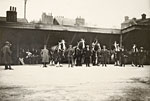 Shire Horses
Shire Horses
We tend to think of
horses as part of our leisure life - during the 1920s they were an
important part of the transport system for hauling goods short
distances.
Here council
shire horses parade at the Council Yard, Exe Island, before
pulling carnival floats through the city. Each handler would 'trace the horse up' for best horse
rosette. The left hand horse is 'Prince' with his handler, Arthur Burrows - c 1925. Photo Sylvia Hart
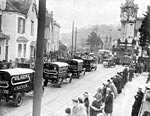 Colson's vans
Colson's vans
Dating from about
1928, these Colsons vans are taking part in a parade heading towards
Queens Street. The previous photograph shows horses towards the end of
the horse drawn age, while the Colson's vans represent the future.
Other vehicles taking part in the parade that day included fire engines
and Devon General buses.
Leisure in the 1920s
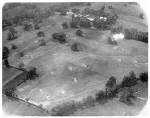 Exeter
Golf Club
Exeter
Golf Club
Probably the earliest aerial photograph of the Golf and Country Club in existence. The club moved from the top of Pennsylvania to the Wear House estate at Countess Wear during May 1929.
 The Olde
Chevalier Inn
The Olde
Chevalier Inn
An advert for the Olde Chevalier Inn in
1929/30 - this historic inn was situated at the top of Fore Street,
approximately opposite the present British Home Stores. It was
destroyed in the raid of May 1942 and was one of the many historic
buildings lost that night.
 Wireless
Set advert
Wireless
Set advert
This is the earliest advert I have found so far
for a wireless in an Exeter shop. The two models shown were crystal
sets and had a range and price of 25 miles and £5-10-0, and 30
miles and £9-15-0 respectively. Circa 1924.
 The
Bullers Arms
The
Bullers Arms
Hubert Wellaway was the publican of the Bullers
Arms in Alphington Street between 1914 and 1927. The Bullers Arms
became Exeter's first public house to put up a sign welcoming motorists
in 1905, although it had always been noted for having good stabling.
There was a boxing ring at the rear of the premises. See Boy Wellaway the boxer. Hubert
Wellaway went on to run a fruiterers in Cowick Street during the 1930s.
Photo courtesy of Simon Wellaway.
There was an exhibition boxing match at the County Ground between the current British heavyweight champion and Jack Cox, the west country champion in 1923.
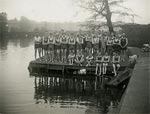 The Head Weir Swimming Club 1927
The Head Weir Swimming Club 1927
The Head Weir Bathing Ground had been used by Exonians for possibly,
hundreds of years. In 1864, the Council first provided basic
facilities, with Frank Shooter the
most famous of the superintendents. This photo taken, after Shooter's
time, in 1927 shows the swimming club members on a pontoon. The King's
Alley pool off the High Street was the only public pool in the
city and it was not until 1940 that the City Swimming baths were
opened. Use of the Head Weir bathing ground ceased by the time the
second war started.
The tram was an important way of getting around. In the 1920s, Worth's published a guide for visitors that included three tram rides. They gave instructions on which tram to catch, and what to see.
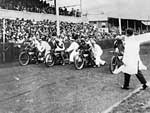
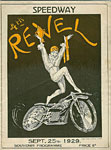 The first Exeter Speedway meeting took place on Saturday 9th March 1929 at the County Rugby Ground in St Thomas. It
started at 7.45 in the evening and featured, Freddie More and from
Australia, Bert Spencer. Seats were priced at 1/-, 1/6, 2/- and 3/- (5p
to 15p). The photo shows an early start in 1929. Photo left
Tony Lethbridge and program right courtesy Speedway Swap Shop
The first Exeter Speedway meeting took place on Saturday 9th March 1929 at the County Rugby Ground in St Thomas. It
started at 7.45 in the evening and featured, Freddie More and from
Australia, Bert Spencer. Seats were priced at 1/-, 1/6, 2/- and 3/- (5p
to 15p). The photo shows an early start in 1929. Photo left
Tony Lethbridge and program right courtesy Speedway Swap Shop
Ladysmith School won the Football Express Elementary Schools Challenge Cup in 1925. In the side was Cliff Bastin who went on to play for Exeter, Arsenal and England. He was transferred from Exeter City to Herbert Chapman's Arsenal for £2,000 on 27 April 1929.
Shops in the 1920s
 J & G
Ross advert
J & G
Ross advert
This very well known men's clothing shop
was next to the Express & Echo office. The rather elaborate advert
from about 1925, plays on the Lord Carnarthon and Howard Carter
excavation of the Tutankhamun tomb in Egypt in 1922. Mr C Ross,
had a private landing stage close to Exe Bridge, where his guests,
suitably attired for a trip in boaters and blazers, would embark for an
excursion to the Double Locks in his launch "Otranto".
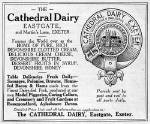 Cathedral Dairy advert
Cathedral Dairy advert
This
was the well known Cathedral Dairy at Eastgate, opposite the London Inn
Square. They were one of the first dairies to sell clotted cream for
tourists, which they would send by post to their friends as a holiday
gift. c 1925
│ Top of Page │